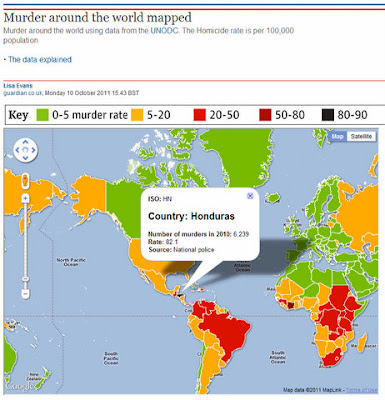
Murder rate around the world
Go to
Guardian UK for interactive map
"We are clear that these [homicide] statistics are high" said the
police commissioner José Luis Muñoz Licona, who pointed out that one of the causes of increased violent deaths "is the product of confrontations between criminal groups, especially between narcotraffickers in the north coast, in the departments of Colón and Atlántida" without putting aside the departments of Cortés, Yoro, and Copán. "We are practically talking about all of the north, west, and Atlantic zones".
A reader sent me a report from the Woodrow Wilson Center:
Organized Crime in Central America: The Northern Triangle (El Salvador, Guatemala, and Honduras). It's a frightening collection of four studies commissioned "to understand more fully how organized crime has evolved in Central America, and to examine the links between organized crime and traffickers in Central America, Mexico and Colombia and the role played by Central America in the supply chain for illegal goods." (Note: try
this link if you are unable to open the PDF directly in your browser.)
Since most of my readers will not have the time to read all 245 pages, I'm including some excerpts related to Honduras that I found most fascinating.
Chapter 1. Drug Trafficking Organizations in Central America: Transportistas, Mexican Cartels and Maras
Central America's Transportistas
page 25
Not since Juan Ramón Matta Ballesteros have Central American
organizations played central roles in drug trafficking. They serve one central purpose: to transport drugs between South America and Mexico. For that reason, they are known in the region as transportistas. Increasingly, however, these organizations have also taken on the role of local distributors and, in some cases, the suppliers of marijuana and poppy, for the production of heroin, as well as importers and suppliers for the raw ingredients of synthetic drugs that are manufactured in Mexico, Nicaragua and possibly Honduras.
Increasingly in Honduras, some [
transportistas] are reportedly emerging from the landed classes—sons of large cattle owners and other agri-business.
page 26

In Honduras, the
transportistas are, by and large, locals who have some experience trafficking contraband, stealing automobiles or rustling cattle. Although several intelligence sources mentioned that large landowners are increasingly entering the business, these landowners appear to be more important as infrastructure than personnel. Nonetheless, as in Guatemala, it is usually a family trade. Two of the more infamous transporters are Nelson and Javier Rivera, former car thieves and cattle rustlers. They run the so-called Cachiros gang, which stretches from Colón along the northern coast to the Gracias a Dios province in the East and the Olancho province to the south. Other, lesser known groups appear to operate in Yoro, Olancho and Cortés.
[See
this Wikileak cable for specific reports of narco activity at the site of prominent Honduran businessman]
DTOs [drug trafficking organizations] in Central America
page 30
These two countries also see the most trafficking: In 2009, an estimated 200 metric tons passed through Honduras, and an estimated 250 tons went through Guatemala. The two main Mexican DTOs operating in these countries are the Sinaloa Cartel and the Zetas.
A Sinaloa Mayor in Honduras. Honduran police intelligence say El Paraiso, Copan Mayor Alexander Ardon works with the Sinaoa Cartel. Ardon has built a town hall that resembles the White House, complete with a heliport on the roof, and travels with 40 heavily armed bodyguards. Cameras monitor the roads leading in and out of the town, intelligence services say. And there are reports that the mayor often closes the city to outsiders for big parties that include norteña music groups flown in from Mexico.
page 31
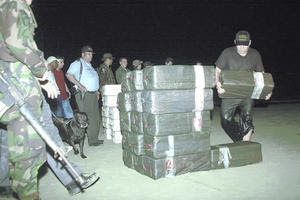
In Honduras, these agents say that Sinaloa factions work closely with transportistas in Olancho and near the Gulf of Fonseca. Sinaloa Cartel members are also reportedly buying land, building houses and co-opting local officials in the Copan, Santa Barbara and Cortés provinces along the Guatemalan border, areas they are also using for storage and trafficking activities
Penetration of the Government Forces and Institutions
page 34
To varying degrees, international DTOs and local transportistas have penetrated portions of the police, treasury, customs, military, attorney general’s offices, jails and court systems in Central America. They regularly finance pubic works and bankroll political campaigns. Their abiity to outspend the governments frustrates the local authorities and thwarts efforts to slow the DTO's growth. This is particularly true in Guatemala and Honduras, two governments that have seemingly lost control over large swaths of their territory.
page 37
In Honduras, in addition to the Copan, Santa Barbara and Cortés provinces alluded to earlier, authorities say the Cachiros’ control the local police in Colón, Gracias a Dios and parts of Olancho. Penetration into the police was evident July 2009, when ten members of the elite anti-narcotics Operation Group were arrested transporting 142 kilos of cocaine. The Cachiros have also attempted to control policy at a national level. When their liaison failed to secure their pick for vice-minister of security, they killed him. The would-be vice-minister is now a representative for congress.
[Los Cachiros also operates in La Ceiba.]
page 39

An uptick by authorities in interdictions of fishing trawlers and cargo ships – “stateless vessels” – has pushed DTOs to rely more on go-fasts and the so-called semi-submersibles. The use of what are essentially mini-submarines is a relatively new phenomenon dating to the late 1990s when a clandestine factory for the first subs was discovered in rural Colombia. Today’s semi-submersibles are 45 to 82 feet in length and are made of fiberglass or steel. They have a range of 2,000 miles and can carry up to seven metric tons of cocaine. U.S. officials estimate that over 60 submarines move over 300 metric tons of cocaine per year.
page 40
Infrastructure abounds in Honduras to facilitate these landings, in particular in the Yoro and Olancho provinces. There are hundreds of clandestine landing strips and numerous old air fields in Yoro courtesy of the banana exporting companies that once dominated the economy. Yoro’s relatively flat terrain also permits airplanes to land on highways and sparsely trafficked roads. Olancho, meanwhile, seems to be a relative newcomer to the drug business. While the infamous Juan Ramón Matta Ballesteros bought large quantities of land in the department, it appears as if enough local agri-business kept drug running activities to a minimum until relatively recently when a so-called “new generation” began “lending” their large haciendas for drug airplanes. Farm owners are reported to receive $50,000 per flight.
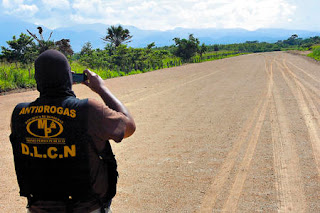
The infrastructure needed to operate these landing strips is minimal. In just a few hours, teams of 25 to 30 men can cut the grass and trees, open up the fences and set up the lights to receive the airplanes. The airplanes are hollowed out and the drugs are packed in what are called fardos, which can weigh as much as a heavy suitcase (about 50 pounds) but are still easily manageable. The amount of drugs the planes carry vary, but one Honduran official said that traffickers found the shorter distance to Honduras gave the DTOs an opportunity to pack more drugs into each airplane. Once a plane lands, it takes between 20 and 30 minutes to offload the cargo into the waiting vehicles. As extra insurance, police are sometimes hired to provide protection and escorts for these drug shipments, for which the commander can receive between $2,500 to $5,000.
Money, Efforts and Challenges
page 52
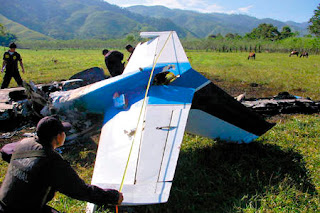
Overall, despite tough talk from its presidents, the region seems ill prepared to face what is arguably a bigger threat to regional security than the civil wars of the 1980s. In many ways, Central American countries are fighting against simple economics. An estimated $38 billion in cocaine flows from South to North America. The U.S. Government estimates that 42 percent of these drugs, representing $16 billion, pass through Central America, more than national government expenditures of Guatemala, Honduras and El Salvador combined in 2009. Fifty-nine percent of Hondurans live below the poverty line; 56 percent live below the poverty line in Guatemala; and 31 percent live below the poverty line in El Salvador.121 The poverty, mixed with the lawless environment that presides over the region, makes it an ideal place for the DTOs to operate. Murder rates in the northern triangle are some of the highest in the world. Impunity reigns. Few crimes are investigated. Fewer are resolved. In Guatemala, for instance, of the 6,451
murders in 2009, investigators resolved just 256.
Chapter 2. Honduras, Organized Crime Gained During Political Crisis
page 63
The public security situation in Honduras is among the worst in the world, ranking among the top five nations with the highest number of violent crimes and murders per capita. The government estimates that one person is killed every 88 minutes. The 2010 UNODC reported that the province of Atlántida, which includes the port city of La Ceiba, was among the most violent in the Western Hemisphere, with 1 person out of every 1,000 killed in violence crimes.
[
Based on the 2010 UN report. Current UN statistics are higher.]
The Sinaloa Cartel
page 65
Police intelligence reports suggest the Sinaloa Cartel has installed operations in the states of Copán, Santa Bárbara, Colón, Olancho, and Gracias a Dios. In late 2009, the U.S. Department of Treasury froze the assets of Agustín Reyes Garza, “Don Pilo,” a member of the Sinaloa Cartel operating in Honduras.
In 2007 and 2008, it is believed that the cartel began buying off or killing potential local rivals. A top cartel leader was sent down to Honduras with a group of Mexican sicarios, or hitmen, over a 15 day period to kill off Honduran rivals. That leader then set up a “sicario school” in Honduras that recruited local operatives to continue providing security and protection for Sinaloa operations.
page 67
Minister of Security Óscar Álvarez has warned that the Sinaloa Cartel is attempting to buy off mayors and municipal officials while corrupting police officers. In that way, it is trying to create “parallel government structures” at local levels that will allow it a greater freedom to operate.
Reporting on the Sinaloa cartel’s activities, particularly its corruption of government officials, has become dangerous for Honduran reporters. Journalist Nahun Palacios of Radio Tocoa and Canal 5 in Colón was killed in March 2010. David Meza was killed near the port of La Ceiba after reporting on Sinaloa cartel activities in the area. Both had received threats from the drug trafficking organization prior to their deaths.
The Zetas
page 67
With the break between the Gulf Cartel and the Zetas in Mexico, the Zetas took over many of the operations inside of Honduras. They maintained ties with corrupt officials and kept track of the land titles and routes landing air and sea shipments in Honduras.
page 68

Like the Sinaloa Cartel, the Zetas have begun managing clandestine runways and transportation networks in Honduras. The country has become a key transfer point to take control of the cocaine as it heads northward into Mexico and then the United States. While some of the Zetas’ land routes overlap with the Sinaloa Cartel’s, the organization appears to prefer trafficking by sea, leaving from the area in or around La Ceiba and going to Guatemala, where they have better control of land routes, or all the way to Mexico.
From South America to Honduras
page 72
Nearly all of the world’s cocaine is produced in three countries in South America: Colombia, Peru, and Bolivia. The cocaine destined for the North American market must travel by boat or air to Central America and the Caribbean and onward to the United States.36 Approximately 90 percent of cocaine going to the United States travels through Central America and/or Mexico, though some analysts believe there has been a slight shift to the Caribbean route in the past year as Mexico has cracked down on drug trafficking in its territory.
Other Illegal Activity Linked to Organized Crime
page 77
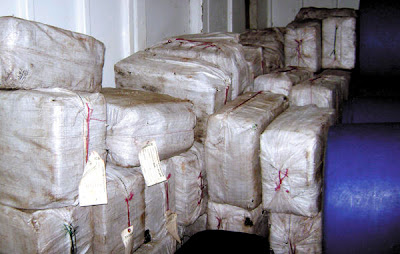
While the bulk of organized criminal money in Honduras is made from drug trafficking and extortion, a number of other illicit services occur as well. Some of these, like money laundering, are directly linked to the drug trafficking operations.
Honduras has a money laundering task force, but according to local authorities money laundering is less of an issue in Honduras than in some of its neighbors. The bigger issue concerns the large amounts of bulk U.S. cash smuggled through the country. As exchanging a large amount of U.S. dollars into Honduran currency (lempiras) is not particularly easy, most criminals and their related networks functioning in the gray and legal market prefer to work in U.S. dollars in Honduras. With limited government capacity to investigate financial crimes, criminals do not always feel the need to launder the money. In a country in which many crimes are never investigated or prosecuted, criminals who decide to keep their profits in Honduras can spend ‘dirty’ money with impunity without going through the time, effort, and cost of laundering the money.
Bulk cash smuggling is largely done over land routes or by air, often on legal flights from major airports. For example, in early October 2010, the Honduran police arrested four Colombian citizens attempting to traffic nearly US $1.5 million from the San Pedro Sula airport.
The effects
page 80
The influence of organized crime is evident in many locations, but no criminal organization “controls” large swaths of territory. Mexican DTOs have varying degrees of prevalence across the country, but there are few areas where analysts can clearly say, “this is Sinaloa territory” or “this is Zeta territory” in the way that areas of Mexico or Guatemala can be identified and mapped. Rather, there is a significant amount of overlap among the Mexican groups. There are indications that some gangs (maras) exercise significant control over neighborhoods (colonias) of the capital and San Pedro Sula, but these are more local phenomenon than transnational crime.
Impunity for crimes remains a problem.
Corruption within the Honduran political and security system is widespread due to the influence of organized crime. Drug trafficking organizations are willing to pay a month’s wages to a police officer or solider for one or two nights worth of work. Current and former police officers have been recruited to provide security. The corruption also creates a level of distrust within the institutions of government. Civilian and military organizations are more reluctant to share information outside their organization when they believe that it may be leaked to the criminals.
Politicians have also been linked with organized crime. For example, in 2003, a member of the Honduran Congress, Armando Ávila Panchamé of the Nationalist Party, was sentenced to 20 years in prison after being caught operating with a Colombian group bringing cocaine into the country. There is also strong evidence that at least one local mayor near the Guatemalan border, Alexander Ardon of the town of El Paraiso, has been corrupted by the Sinaloa cartel. Authorities suspect the number of mayors who receive a plata o plomo [silver or lead] style threat from the cartels is growing.
page 81
While the issue of human rights is generally discussed in the context of government actions or obligations, it’s worth noting that the criminal organizations in Honduras are a key violator of human rights in the country, depriving citizens of their right to life and security and indirectly violating their rights to fair and impartial institutions of justice by undermining the government institutions that do investigative and judicial work
page 91
Too often, government officials suggest that victims of crimes have been involved with DTOs or maras before full investigations are completed, which likely harms the ability to investigate organized crime and end impunity.
~~~~~~~~~~~~~~~~~~~
Even if you don't read the entire study, just from the excerpts that I posted, I think you can see that the situation looks pretty dire for Honduras.
I don't want to imply that I believe that narcotrafficking is responsible for all of the crime in Honduras, but there is no question that it plays a major part in it.
You might also be interested in these Blogicito summaries of a 2008 La Prensa exposé on Narcotrafficking in Honduras

























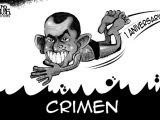
 Traffic operativos are nothing new. They happen all the time. On our last trip to San Pedro Sula from La Ceiba in September, we passed five operativos, only slightly more than usual. We were waved through on two of them, one time we were stopped but when we rolled down the window, the officer waved for us to move on. In two stops, our paperwork was checked and once they asked us if we were carrying guns (but didn't search the car). Once the officer asked us to roll down the back windows and he took a fleeting glance at the back seat which was packed full of stuff. My point is that we could have been wanted criminals, we could have been carrying guns or drugs, but the police did nothing except determine that our paperwork was in order.
Traffic operativos are nothing new. They happen all the time. On our last trip to San Pedro Sula from La Ceiba in September, we passed five operativos, only slightly more than usual. We were waved through on two of them, one time we were stopped but when we rolled down the window, the officer waved for us to move on. In two stops, our paperwork was checked and once they asked us if we were carrying guns (but didn't search the car). Once the officer asked us to roll down the back windows and he took a fleeting glance at the back seat which was packed full of stuff. My point is that we could have been wanted criminals, we could have been carrying guns or drugs, but the police did nothing except determine that our paperwork was in order.
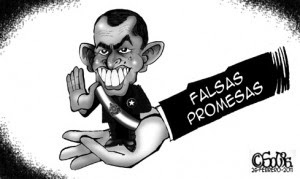
 Welcome to my Blogicito —
Welcome to my Blogicito — 








